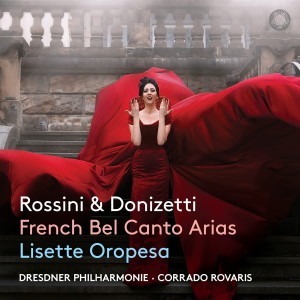
Lisette Oropesa (soprano)
French Bel Canto Arias
Sächsischer Staatsopernchor Dresden
Dresdner Philharmonie/Corrado Rovaris
rec. 2021, Kulturpalast Dresden, Germany
Sung texts with English translations enclosed
Reviewed as downloaded from press preview
PENTATONE PTC5186955 SACD [65]
The Pentatone label has released this outstanding collection of French language bel canto airs from Rossini and Donizetti sung by lyric coloratura soprano Lisette Oropesa.
American-born of Cuban heritage, soprano Lisette Oropesa first came to my attention in 2018 as Marguerite de Valois in the run of acclaimed performances at the Opéra Bastille in Paris of Les Huguenots, a French Grand Opera written by Meyerbeer, who had absorbed the Italianate bel canto style as championed successfully by Rossini, Donizetti and Bellini. In 2020 Oropesa’s first Violetta for the Metropolitan Opera, New York gained many plaudits; George Loomis in Opera magazine described it as ‘a sensational portrayal that left long-time denizens of the house struggling to recall her equals in the role.’
During the Paris run as Marguerite, Oropesa conceived the idea for this recital album: a programme of airs by Bellini, Rossini and Donizetti. As so many singers of her Fach have released albums of Italian bel canto arias, Oropesa settled on arias from French language operas by Rossini and Donizetti that were all premiered in Paris, including Lucie de Lammermoor, a re-working especially for Paris in 1839 of Lucia di Lammermoor (1835). (Bellini was also considered for inclusion but no suitable French language material was found.) Rossini is represented by airs from his first French language opera Le siège de Corinthe (1826), Le comte Ory (1828) and his final masterwork, Guillaume Tell (1829). His younger contemporary Donizetti provides airs from Lucie de Lammermoor (1839), La fille du régiment (1840) and Les martyrs (1840). Oropesa explains that this album satisfies ‘her great loves, the French language’ – which she has studied – and Italian bel canto. It certainly suits my taste that Oropesa’s programme is a mix of airs that are well-known today and those rarely heard.
The Rossini airs that stand out are those from Le siège de Corinthe, a tragédie lyrique in three acts premiered in 1826. Seldom staged today, Le siège was a partial rewrite of his Italian opera Maometto II. It is set during the war between Greeks and Turks; Pamyra is the daughter of a Greek governor and in her Act Two scene Que vais-je devenir? (What will become of me?) containing three airs, she is joined by the chorus of Turkish women. Here, Pamyra must choose between her love for Turkish enemy leader Maometto and her obligations to her father and Greece. It is a highlight how Oropesa generates both drama and tension and her coloratura is tellingly conveyed.
I particularly enjoy is Marie’s Il faut partir (I must leave) from Act One of Donizetti’s La fille du regiment, his opéra comique from 1840. Marie, the much-loved girl soldier is set to leave the regiment with her newly discovered aunt, the Marquise. Oropesa is in glorious voice, so convincingly poignant as Marie implores the soldiers to hide their tears at her departure.
Savouring the technical and artistic challenges of Rossini and Donizetti, Oropesa is in sparkling form, especially assured in her high register, in airs that seem tailor-made for her voice. At times, her fearless and full-blooded coloratura comes at the expense of steadiness but the results are always exciting.
The Dresdner Philharmonie excels in unity and expression under conductor Corrado Rovaris. Adding to the success of the album is the first-class support from the Staatsopernchor Dresden. This hybrid multi-channel SACD, that I played using my standard unit, has been successfully recorded for Pentatone under studio conditions in the outstanding acoustic of the Kulturpalast, Dresden. Francesco Izzo’s booklet essay ‘French Bel Canto: An Oxymoron?’ is well worth reading. It is good, too, that sung French texts and English translations are provided. This collection is a delight from start to finish.
Michael Cookson
Previous review: Göran Forsling (Recording of the Month – November 2022)
Contents
Gioacchino Rossini (1792-1868)
Le siège de Corinthe (1826)
Act 2, No. 5
1. Que vais-je devenir?
2. Du séjour de la lumière
Act 3, No. 12
3. L’heure fatale approche
4. Juste ciel
Guillaume Tell (1829)
Act 2. No. 9
5. Ils s’éloignent enfin
6. Sombre forêt
Le comte Ory (1828)
7. En proie à la tristesse
8. Céleste providence
Gaetano Donizetti (1797-1848)
Les martyrs (1840)
Act 1, Scene 5
9. Ô ma mère
10. Qu’ici ta main glacée bénisse ton enfant
Lucie de Lammermoor (revised 1839 French version)
Act 1, Scenes 6 & 7
11. Gilbert… Ô fontaine
12. Que n’avons-nous des ailes?
La fille du régiment (1840)
Act 1, No. 6
13. Il faut partir
Act 2, No. 8
14. C’en est donc fait
15. Salut à la France!
Help us financially by purchasing through





















